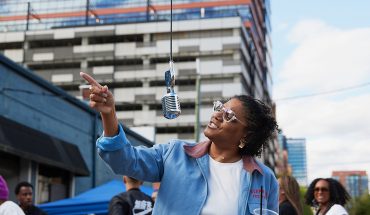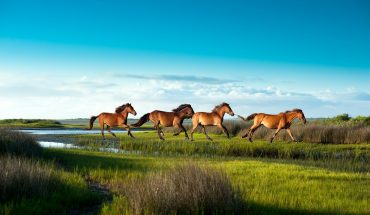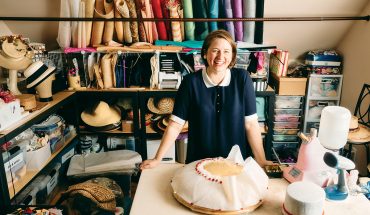
DK_Photos
by Mimi Montgomery
Home. It’s a broad concept with a myriad of meanings. Homer touched on it a bit with his boy Odysseus and his travels after Troy’s fall; Faulkner obsessed over home and its rootedness in the past; and I’m pretty sure Bruce Springsteen would just be a dude singing in a New Jersey Applebee’s without his beloved hometown ballads.
I think the overall definition of home is fluid and personal, but Frost summed it up pretty nicely when he said, “Home is the place where, when you have to go there, they have to take you in.” If this sounds analogous to a Best Western motel, you’re not incorrect – sometimes home isn’t the best option, but it does tend to serve a continental breakfast. Allow me to reference the lyricism of another laureate, the rapper DMX, when I say home can also be the place where one feels, “Y’all gonna make me lose my mind, up in here, up in here.” I’m almost positive this line is an allusion to visiting his childhood home and hiding in the bathroom, organizing decades-old travel-sized shampoo bottles to avoid conversation and preserve sanity. That or the ritualistic showcasing of one’s masculinity in the face of peer aggression. Either one.
Admittedly, I’ve only been on this earth a short 25 years, but I’ve already called a few places home. I was born in Duke Hospital, in the same room my brother would be born in two-and-a-half years later. I then called Purnell, Raleigh, Gastonia, Charlottesville, Va., and Washington, D.C, home, and then Raleigh again. I’m now settling into my most recent home-again: D.C. And as I look ahead, and look back, the idea of home is a common subject of contemplation in my life, right behind my most-considered existential question: At what time will my next meal be?
When my parents took me home from the hospital, even my freshly developed brain could tell my house wasn’t like the other newborns’. Instead of an elegant neighborhood or charming historic home, they brought me back to the trout farm my father managed in Purnell. He had quit practicing law to be amongst the fish. We lived in a little wooden house that my father found romantic and Walden-esque; my mother maintains it was a picnic shelter closed in with plywood. She may have been right: She once walked into my nursery to find me in my crib, mites crawling down the walls to host a social hour in my little ears; of course, my dad posits this was a positive occurrence, as evidenced by the stellar immune system I boast today. To this day, my mother still cannot talk about this period of life without banging her head against whichever firm object is closest.
The trout pond bordered the picnic shelter, and my mother tells a story about the time I fell in and was underwater for an extended period of time before I was retrieved. (Yes, I am quite certain that oxygen deprivation has contributed to my adult mental state.) As a result of this incident, in many of the pictures from my toddler years I am wearing a life vest, even indoors.
We were only too happy to share the idyll with a pack of basset hounds: Virginia Woolf, Victor Hugo, and George Eliot, who did not inherit the allure or literary flair of their namesakes. We also had neighbors, a rather rambunctious couple named Minnie and Maynard. One day, they called my parents to ask if it’d be alright for them to hunt the squirrels on our property. Unfortunately, they’d already depleted the squirrel population on their land, and apparently once you’ve developed a palate for squirrel meat, there’s no going back. It was a tough decision, but my parents somehow found it in themselves to acquiesce.
Minnie and Maynard didn’t waste any time: They began laying out peanuts and hazelnuts for the squirrels to eat, eventually earning the squirrels’ trust until they were basically tame. Then they snuck up on them, grabbed them by the tails, threw them in a pillowcase, and bashed them upside the head (if you shot them, Maynard explained to my mother, you ran the risk of damaging the meat). Moments like these were why we didn’t have cable television; no show could compete with staring out your back window at a couple with alliterative names swinging rodents around in a bag.
We also had beavers. This was extremely problematic for the trouts’ delicate ecosystem, and even more so for my father’s. He went full-on Captain Ahab and waged an aggressive scorched earth attack to beat back the furry invaders. Such devastation hadn’t been seen since General Sherman’s March to the Sea: By all accounts it was a bloody battle, but the most egregious war crime occurred when my mother opened the freezer to find a rock-hard beaver body squashed next to the ice cream. My father was saving it so he could have it taxidermied, he told her, a symbol of his conquest. Despite this reasonable explanation, my mother decided things were getting a little too Deliverance for her liking. It was time to hightail it back to civilization. But not before an affinity for country life, not to mention a great disdain for beavers, had become ingrained on my young psyche.
We moved to Raleigh, where my dad renounced all interaction with aquatic creatures, dug out his suits, and became a banker. He worked on Glenwood South, and my brother and I visited him in the afternoons, walking down to Snoopy’s or Char-Grill for hot dogs or a milkshake. We went to Christ Church downtown, which I loved not for spiritual reasons but for the rooster on its steeple and its proximity to the real site of holiness, Marbles Kids Museum.
This ingenuity, this pioneerism in the place that had created me, instilled a greater sense of pride than I could have ever possibly imagined.
Although inside the beltline, my parents’ inner crunchiness couldn’t be silenced, and they enrolled me in Montessori school. They did the same with my brother, although his time there was more devastation than education. Gibson was what one calls “a spirited child” in polite conversation, although I believe the term “crazy-ass gremlin” may be more appropriate. Gibson believed the great burden of Wake County’s safety sat squarely on his three-year-old shoulders. Ever-vigilant, every morning he would don a black bank-robber mask, red cowboy boots, and a plastic knife and gun in a holster – because a man should always leave the house with at least two forms of protection. The mayor and Wake County police could breathe a sigh of relief: The real head honcho had arrived (he just wasn’t allowed stay up past 8 p.m.).
Surprisingly, this did not fly within the Montessori structure, which was a little too Yellow Submarine for Gibson’s taste. If Montessori school was a bowl of macrobiotic miso soup, my brother was an all-American Frito casserole. It just wasn’t meant to be. To make a long story short, there was a security breach on the playground, and my brother, with the power vested in him by Fisher-Price, was forced to secure the perimeter by any means possible. The exact details are debatable, but let’s just say his red cowboy boots were put to good use.
Gibson was firmly encouraged to further his education elsewhere; my mom took on the headmaster like a WWE female wrestler one match short of a championship belt; schisms erupted; and, in a nod to our 16th-century Anglican forebearers, the Montgomery clan officially split from the Montessori papacy.
Thus ended my time calling Montessori school home; soon after, Raleigh was no longer my home, either. But it left its mark: I still have a Montessori-like appreciation for the granola subculture, and very few things bring me joy like a Char-Grill milkshake.
Both of my parents’ jobs then took us to Gastonia, a town I’d call home for the next 12 years, until I graduated high school and went to college in Charlottesville, Va. In that little town amongst the blue-green hills I found a home I came to love so much it was hard to believe I’d ever lived anywhere else. A job after college took me to Washington, D.C., where I went on runs through the cobbled streets of Georgetown and drank beer in bars that sat in the Capitol’s shadow.
And then something surprising – serendipitous – happened: I got a job in Raleigh. After 16 years, I was moving back to where I started. Living in Raleigh was both familiar and not: I went to services at Christ Church and sat on the same garden benches my dad and I occupied on Sunday mornings to drink lemonade. The Snoopy’s and Char-Grill were still there on Hillsborough, and the pizza at Lilly’s had gotten even better, if possible.
But Raleigh, and North Carolina in general, was different than when I’d left it. Everywhere I went I met people who had no ties to this area whatsoever but had actively chosen to come here, selecting the Triangle over big metropolitan names across the country. Folks were founding start-ups, pioneering virtual reality experiences, making their own 3-D shoes, all right here in the very same place I learned to walk.
Previously, I’d seen my state as something to leave behind, a starting point for a wild, exciting life that would no doubt take place somewhere else. New York, D.C., LA – that’s where the real living was to be done, not in some sleepy Southern place I associated with childhood boredom.
But this Raleigh, this North Carolina, was different. This ingenuity, this pioneerism in the place that had created me, instilled a greater sense of pride than I could have ever possibly imagined. I was suddenly that dork who wanted to buy a North Carolina T-shirt or pushed local beers on out-of-town guests. Like any great love story, it took leaving and coming back to make me realize how lucky I truly am.
This year, I’m moving back to D.C. to start graduate school at Georgetown. Clearly, my life has held cyclical patterns, for which I’m so happy. It’s a lucky group of people who get to live life in multiple places that hold such strong connections to their past.
That said, I’ve long struggled with the notion of home, questioning where my true loyalties lie: Is Gastonia my home? Is Charlottesville? D.C.? Raleigh, or North Carolina in general? Can one choose a home, or is it an association that develops on its own?
I think it’s a little bit of everything, thankfully, a little bit mysterious and unknowable, but at once familiar and rooted, and for that I’m glad. Despite all talk of latitude and longitude, home to me will always be the quirky moments that slowly molded me, the people I love, and all the places I’ve been. I’m just glad Raleigh is on the list.



